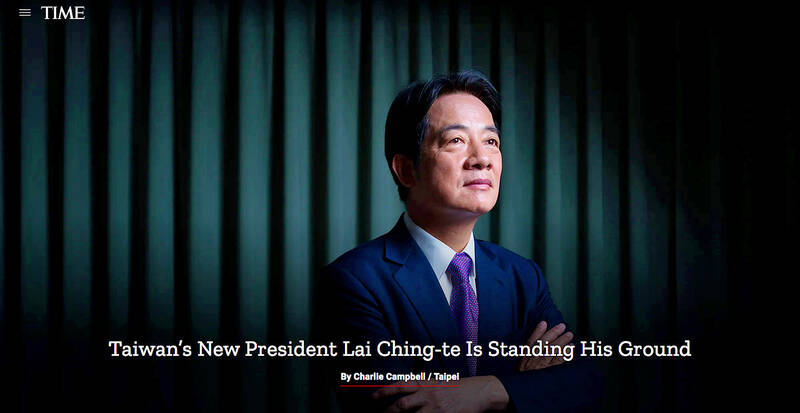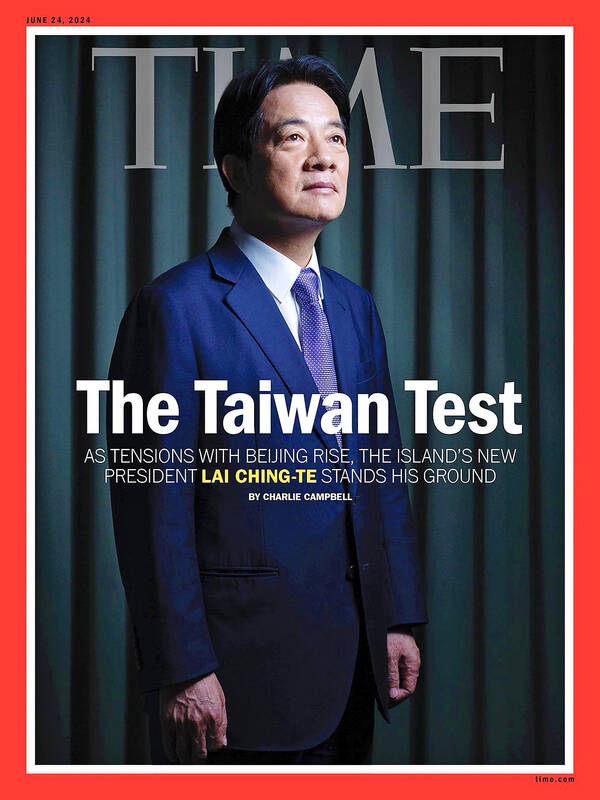A prosperous Taiwan can bring about progress in China, and Taipei seeks peace and prosperity across the Taiwan Strait, President William Lai (賴清德) told Time magazine in an exclusive interview published yesterday, his first since becoming president.
Taiwan wishes for a stable and prosperous China, as it would help maintain peace and stability in the region, he said.
“I have always believed that a stable China leads to a safer Taiwan. A prosperous Taiwan can also bring about progress in China,” he was quoted as saying, while asked if China’s problematic economy could be an opportunity for further engagement across strait. “I do not wish to see growing difficulties in China’s economy or its society become more unstable.”

Photo: screen grab from the “Time” Web site
The new government under his administration “is willing to assist China and advance peace and prosperity across the Taiwan Strait,” Lai said.
Asked to comment on China’s courting of the global south to get diplomatic support for its so-called “reunification” of Taiwan, Lai called on all nations to “respect the choice of the Taiwanese people.”
The will of Taiwanese “should not be subject to decisions made by a majority or show of hands” in the international arena, he said, before expressing the hope that the global community would “assist, understand and support” Taiwan.

Photo: screen grab from the “Time” Web site
Regarding Beijing’s continued refusal to engage with Taipei, Lai said he would continue to uphold former president Tsai Ing-wen’s (蔡英文) “four commitments.”
The term refers to Taiwan’s commitment to a democratic constitutional system, not being subordinate to China, protecting national sovereignty and the right of Taiwanese alone to determine their future.
Chinese President Xi Jinping (習近平) is urged to understand that initiating a Taiwan Strait conflict and disrupting peace and stability in the Indo-Pacific region “will not be accepted by the international community,” Lai said.
“I invite President Xi to jointly shoulder with us the responsibility of maintaining peace and stability, building regional prosperity, and advancing world peace.” He added.
Responding to a question about Beijing’s ire at his inauguration speech in which he stated that Taiwan and China are not subordinate to one another, Lai said his comments were a truth that others had expressed previously.
“My intention was not to provoke. During her 2021 National Day Address former President Tsai said as part of her Four Commitments that the ROC and PRC are not subordinate to each other. Former President Ma Ying-jeou had also once said the ROC is a sovereign and independent state and that neither side of the strait is subordinate to the other, Lai said.
“I stated this in accordance with Articles 2 and 3 of the ROC Constitution, given that on Taiwan we have our own people, land, sovereignty, and government. According to international law, we are already a sovereign and independent country”, Lai stressed, “ My goal is to bring the people of Taiwan together.”
Taiwan has an advantage in semiconductor manufacturing, Lai said, while emphasizing the “global division of labor” sustaining the supply chains of the technology industry.
The components, equipment and technology utilized by the nation’s chip industry are sourced in the US, Japan and the Netherlands, in addition to countries around the world that contribute to the supply of raw materials, he said.
Taiwan “has a responsibility to promote global prosperity and development,” Lai told Time, adding that the government would respect chipmakers’ decision to expand operations into the US, Japan or the EU if they chose to do so.
He said that his administration’s policy is to bolster Taiwan’s democracy, regional peace and the nation’s diplomatic outreach to the world.
“Taiwan will continue to move in the direction of democracy, peace and prosperity, linking us with the international community,” Lai said, adding that the nation’s engagement with the world community advances global prosperity and development.
Asked to comment on the Democratic Progressive Party’s loss of its majority in the legislature, he expressed optimism, he said: “I remain fully confident about the future development of Taiwan.”
Decades of collective effort and the sacrifice of many people imbued the “vitality and values of democracy” in Taiwanese, he said.
A “divided legislature is the will of the people. This provides an opportunity for each party to share their ideas and jointly bear the responsibility of serving the nation,” he told the magazine. “If any one party does not live up to public expectations, I trust that people will respond accordingly so that the country can still move forward.”

AIR SUPPORT: The Ministry of National Defense thanked the US for the delivery, adding that it was an indicator of the White House’s commitment to the Taiwan Relations Act Deputy Minister of National Defense Po Horng-huei (柏鴻輝) and Representative to the US Alexander Yui on Friday attended a delivery ceremony for the first of Taiwan’s long-awaited 66 F-16C/D Block 70 jets at a Lockheed Martin Corp factory in Greenville, South Carolina. “We are so proud to be the global home of the F-16 and to support Taiwan’s air defense capabilities,” US Representative William Timmons wrote on X, alongside a photograph of Taiwanese and US officials at the event. The F-16C/D Block 70 jets Taiwan ordered have the same capabilities as aircraft that had been upgraded to F-16Vs. The batch of Lockheed Martin

GRIDLOCK: The National Fire Agency’s Special Search and Rescue team is on standby to travel to the countries to help out with the rescue effort A powerful earthquake rocked Myanmar and neighboring Thailand yesterday, killing at least three people in Bangkok and burying dozens when a high-rise building under construction collapsed. Footage shared on social media from Myanmar’s second-largest city showed widespread destruction, raising fears that many were trapped under the rubble or killed. The magnitude 7.7 earthquake, with an epicenter near Mandalay in Myanmar, struck at midday and was followed by a strong magnitude 6.4 aftershock. The extent of death, injury and destruction — especially in Myanmar, which is embroiled in a civil war and where information is tightly controlled at the best of times —

China's military today said it began joint army, navy and rocket force exercises around Taiwan to "serve as a stern warning and powerful deterrent against Taiwanese independence," calling President William Lai (賴清德) a "parasite." The exercises come after Lai called Beijing a "foreign hostile force" last month. More than 10 Chinese military ships approached close to Taiwan's 24 nautical mile (44.4km) contiguous zone this morning and Taiwan sent its own warships to respond, two senior Taiwanese officials said. Taiwan has not yet detected any live fire by the Chinese military so far, one of the officials said. The drills took place after US Secretary

THUGGISH BEHAVIOR: Encouraging people to report independence supporters is another intimidation tactic that threatens cross-strait peace, the state department said China setting up an online system for reporting “Taiwanese independence” advocates is an “irresponsible and reprehensible” act, a US government spokesperson said on Friday. “China’s call for private individuals to report on alleged ‘persecution or suppression’ by supposed ‘Taiwan independence henchmen and accomplices’ is irresponsible and reprehensible,” an unnamed US Department of State spokesperson told the Central News Agency in an e-mail. The move is part of Beijing’s “intimidation campaign” against Taiwan and its supporters, and is “threatening free speech around the world, destabilizing the Indo-Pacific region, and deliberately eroding the cross-strait status quo,” the spokesperson said. The Chinese Communist Party’s “threats